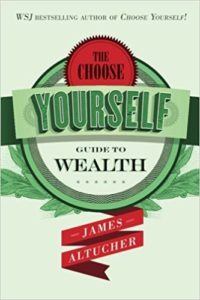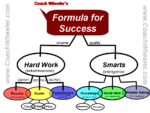 This article is a little different from the other ones on this blog. Different in a good way. The topic of Success is probably more related to your career or life in general… and less “basketball specific”. I think you will find that Coach Wheeler’s “Formula for Success” is in the vein of John Wooden’s “Pyramid of Success” that he taught his players at UCLA. If you want to “build a winning mindset”, you will definitely be interested in Coach Wheeler’s “Formula for Success”.
This article is a little different from the other ones on this blog. Different in a good way. The topic of Success is probably more related to your career or life in general… and less “basketball specific”. I think you will find that Coach Wheeler’s “Formula for Success” is in the vein of John Wooden’s “Pyramid of Success” that he taught his players at UCLA. If you want to “build a winning mindset”, you will definitely be interested in Coach Wheeler’s “Formula for Success”.
What kind of Formula for Success
are we talking about?
While Wheeler’s Formula for Success is primarily focused on business or career success, it can be applied in other ways. (I am hoping you will leave a comment after reading this article saying how you are going to apply the ideas in your life.) If you are looking for financial success, whether you have a job or a business, you will certainly find this “thinking framework” helpful.
Inspired by…
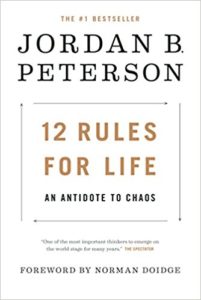 The top level concept, that your “volume & quality of work” determines your overall success, was inspired by Jordan B. Peterson. He is a clinical psychologist, tenured Professor at University of Toronto and, in general, a pretty smart guy from what I can tell. His knowledge of clinical psychology studies allows him to provide insights that many other “self-help” authors either miss or aren’t backing up with science. To paraphrase the success quote from him that inspired this article, “Success in life is predicted, primarily, by 2 traits: industriousness and intelligence.” (He also has a book out that is called “The 12 Rules for Life” which I have heard a lot about on podcasts so I am hoping to read it soon.)
The top level concept, that your “volume & quality of work” determines your overall success, was inspired by Jordan B. Peterson. He is a clinical psychologist, tenured Professor at University of Toronto and, in general, a pretty smart guy from what I can tell. His knowledge of clinical psychology studies allows him to provide insights that many other “self-help” authors either miss or aren’t backing up with science. To paraphrase the success quote from him that inspired this article, “Success in life is predicted, primarily, by 2 traits: industriousness and intelligence.” (He also has a book out that is called “The 12 Rules for Life” which I have heard a lot about on podcasts so I am hoping to read it soon.)
First Layer of the Formula…
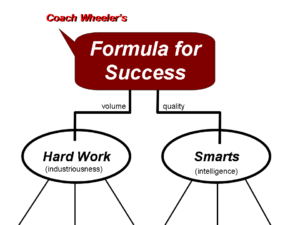 This probably won’t sound earth shattering but it should make immediate sense when you think about it. “The volume and quality of your work determines your [eventual] success in life.” Duh? Right?
This probably won’t sound earth shattering but it should make immediate sense when you think about it. “The volume and quality of your work determines your [eventual] success in life.” Duh? Right?
If we stopped there, you probably would not get much out of this formula because that statement is common sense. But if we go deeper, you should find more ideas that you can turn into actions which will lead you to more success in your chosen field.
Next Level…
As you can see in the diagram above, I am calling the “volume” side of the formula “Hard Work”. I think we can all agree that putting in more effort and time (the definition of “hard work”?), will result in more output and productivity. If you produce more, your results should (over time) lead to success.
What goes into “Hard Work”?
 The Formula for Success has 3 parameters under “Hard Work”. They are (1) Passion, (2) Health and (3) Consciences. Let’s look at each in more depth.
The Formula for Success has 3 parameters under “Hard Work”. They are (1) Passion, (2) Health and (3) Consciences. Let’s look at each in more depth.
(HW-1) Passion. We all need motivation if we are going to put in the hard work that is needed for success. Developing the skills of self motivation will help you do the work that others (i.e. the competition) won’t. It will also help you go further than the competition as well. The reason it is such common wisdom to say “Live Your Passion” is because it is critical to enjoy the process of “work” … so you will do more than your competitors. Think about it this way, if you are motivated by a passion for your work… is it really HARD work? Probably not. On the other hand, will you be passionate about everything you need to do? No, but we will talk about that in the third element of Hard Work, Consciences.
(HW-2) Health. This should be self-evident and common sense, but if you don’t maintain your health, you won’t be able to produce as much as possible. Letting your health decline will reduce your energy and may even “take you out of the game.” Aside from all the diet guru’s who are giving you weight management advice, Health is actually pretty simple. The three key elements of Health are a) Food, b) Sleep and c) Play.
I use the word “Play” (instead of exercise) on purpose. If you approach exercise as drudgery, you won’t enjoy it and I have heard that the effectiveness will actually decrease. Choose an exercise that you can, on some level, enjoy. It will energize your mind while building up your physical capacity at the same time.
Do we really need to discuss Diet & Sleep? 8 hours of sleep is a good goal but you can tell what works for you. If I could recommend one change to your diet, I would ask you to drink more water (instead of calorie-filled & chemical-filled drinks). We all know that green veggies are your friend… and they will impact your health & work output. Think about it like this… imagine you get a raise at work for every time you have a meal with green vegetables. [It doesn’t really work like that, but isn’t it a neat way to convince yourself to eat better?]
(HW-3) Consciences. This is related to self-discipline as well as self-identity. Are you the type of person who does what needs to be done? Especially WHEN it needs to be done? Author Jocko Willink has a good quote (and book by the same name), “Discipline = Freedom“. This is the one area that you can make the most immediate impact … if you pay attention to your thoughts and take control of your habitual ways of thinking.
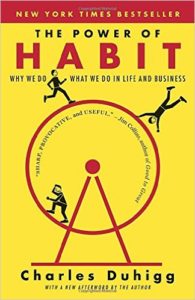 I’m not talking about willpower. Willpower is a limited resource and it can “go away” when you are tired at the end of a long day or you have a dip in your motivation. Be sure to build as much of your “need to do” activities into habits and routines that you don’t have to think about. A good book for learning how to do this is “The Power of Habit” by Charles Duhigg.
I’m not talking about willpower. Willpower is a limited resource and it can “go away” when you are tired at the end of a long day or you have a dip in your motivation. Be sure to build as much of your “need to do” activities into habits and routines that you don’t have to think about. A good book for learning how to do this is “The Power of Habit” by Charles Duhigg.
One more thing about Hard Work…
Before we look at the other side of the formula (Smarts), I should explain one particular part of the Hard Work diagram. Did you notice the words “Goya”, “Goya”, “Goya” where the connector lines lead into the Hard Work bubble? This is taken from a motivational speech by inspirational keynote speaker Croix Sather. GOYA is an acronym for “Get Off Your Ass”. In terms of Coach Wheeler’s formula for success, GOYA is a reminder that you need to TAKE ACTION and not just think about what you should be doing. This is also a great transition into the “Smarts” portion of Coach Wheeler’s Formula for Success… as we keep in mind that thinking alone won’t get you what you want!
Let’s Get Smart!
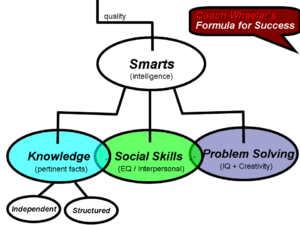 The second major component of Success is “Smarts” or “general intelligence”. Coach Wheeler breaks this down into 3 parts, (1) Knowledge, (2) Social Skills and (3) Problem Solving. Going back to Jordan B. Peterson, he has said that the studies show intelligence, as measured by IQ, is incredibly difficult to improve. On the other hand, Knowledge can continually be accumulated and you can gather facts or ideas that you can use across a wide variety of situations. Coach Wheeler also added Social Skills to his model for success and we will discuss how to build and leverage them more below.
The second major component of Success is “Smarts” or “general intelligence”. Coach Wheeler breaks this down into 3 parts, (1) Knowledge, (2) Social Skills and (3) Problem Solving. Going back to Jordan B. Peterson, he has said that the studies show intelligence, as measured by IQ, is incredibly difficult to improve. On the other hand, Knowledge can continually be accumulated and you can gather facts or ideas that you can use across a wide variety of situations. Coach Wheeler also added Social Skills to his model for success and we will discuss how to build and leverage them more below.
(S-1) Knowledge. As we go through life, we pick up information that we can then apply to solving problems in the future. This increases the value of our output and increases our chances for success. As you learned above, IQ is tough to change but we can “look smart” by simply learning “the tricks” for success in a given situation. There are typically two ways that we learn… independent learning and structured learning.
Independent learning is when we take the initiative and learn on our own. Examples include watching instructional YouTube video or reading books. There is an amazing amount of information out there and we probably have more access to information now than at any other time in history thanks to the internet and search engines. Smart people continue to learn.
Structured learning would include traditional schooling or perhaps one-on-one coaching. One of my favorite sayings about school is “Math = Money”. This means that learning math in school will help you handle money (and grow your wealth) when you get out into the “real world”. Depending on the quality of your teachers, it might be easy to get bored or “zone out” in school. Stay focused and keep asking yourself questions that help you stay engaged. “How will I use this in my life?” is a good one to start.
(S-2) Social Skills. There are many different types of “Smarts” and your ability to work with, and influence, other people is a major consideration when determining the quality of your work. We are not saying that you should try to make everyone happy. Sometimes you need to create conflict to get what you want or solve the problem that you are presented.
 Another way to look at social skills is your ability to communicate effectively. On top of that, your leadership skills figure into your eventual success. How do you improve these things? Join Toastmasters. They are a world-wide non-profit organization dedicate to helping their members improve their public speaking and leadership skills. Find a chapter near you by visiting their website… Toastmasters International.
Another way to look at social skills is your ability to communicate effectively. On top of that, your leadership skills figure into your eventual success. How do you improve these things? Join Toastmasters. They are a world-wide non-profit organization dedicate to helping their members improve their public speaking and leadership skills. Find a chapter near you by visiting their website… Toastmasters International.
(S-3) Problem Solving. This is typically correlated to the people’s “inherited” qualities of IQ and creativity. Even though much of your qualities may be genetic, there is still a skill that can be developed. If you want more ideas on how to improve your Problem Solving, here is the first article in our series on the topic. To learn when we publish more Problem Solving articles, be sure to sign up for our email notification service (in the right column on this page).
It is a fair statment to say that the quality of your work output is generally tied directly to your ability to solve problems. Brain Power (i.e. IQ) is good to have, especially when you are tackling more complex problems but everyone can learn how to solve problems. If you are motivated and work hard at accumulating the knowledge you need to solve problems in your area of expertise, you will be successful. This is where I tell you that all the parts of Coach Wheeler’s Formula for Success work together to make you successful. But you probably already figured that out, right?
Bottom Line…
Will Coach Wheeler’s Formula For Success work for you? Like they say “The program will work… if you work the program.” I don’t think there is anything too “out there” in this formula. It should be easy to understand… but what are you going to do with it? Can you “up your game” when it comes to Hard Work? What do you need to improve on the “Smarts” side of the Formula for Success? If you don’t change what you do, how can you expect different results? The choice is up to you. You can use the formula… or you can “go with the flow” and take whatever life gives you. Which do you think will turn out the best for you?
Downloadable Bonus !
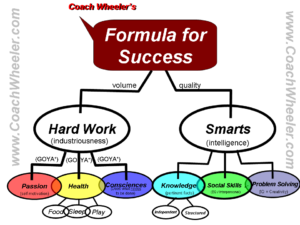 Congratulations! You have made it all the way to the end of this article. You deserve a reward for your efforts. (Hopefully the article was interesting and not exactly “hard work”.) Your bonus for making it this far is a downloadable copy of Coach Wheeler’s Formula for Success diagram. You are welcome to share it on social media and, ideally provide a link back to this article. Right-Click on the link below and “Save As” to get the downloadable PDF version!
Congratulations! You have made it all the way to the end of this article. You deserve a reward for your efforts. (Hopefully the article was interesting and not exactly “hard work”.) Your bonus for making it this far is a downloadable copy of Coach Wheeler’s Formula for Success diagram. You are welcome to share it on social media and, ideally provide a link back to this article. Right-Click on the link below and “Save As” to get the downloadable PDF version!
SuccessFormula-download-CoachWheeler

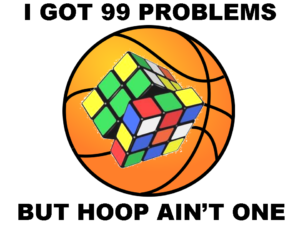 Everyone has problems. If you are alive, you have problems. They might be big, life-changing problems like a diagnosis of cancer or they could be minor inconveniences like a fly buzzing in your ear. That’s not why problem solving tactics don’t work. Problem solving is easier than you think, but I am getting ahead of myself.
Everyone has problems. If you are alive, you have problems. They might be big, life-changing problems like a diagnosis of cancer or they could be minor inconveniences like a fly buzzing in your ear. That’s not why problem solving tactics don’t work. Problem solving is easier than you think, but I am getting ahead of myself.